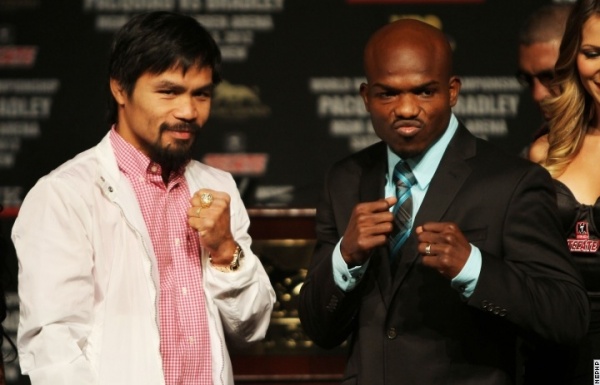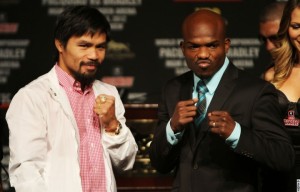
 CHICAGO (jGLi) – American champion Timothy Bradley may be nicknamed “Desert Storm.” But it was not Bradley but the judges in his June 9th bout with Filipino boxing icon Manny “Pacman” Pacquiao, who whipped up a storm of controversy with their questionable decisions.
CHICAGO (jGLi) – American champion Timothy Bradley may be nicknamed “Desert Storm.” But it was not Bradley but the judges in his June 9th bout with Filipino boxing icon Manny “Pacman” Pacquiao, who whipped up a storm of controversy with their questionable decisions.
Even if Bradley would not return the welterweight belt to Manny, his razor-thin victory decided from the subjective eyes of the judges and not by his fists will always have an asterisk in the record books.
I really don’t blame Bradley if he had no plan of “returning-to-sender” Manny’s belt. Like the young Dreamers, who were brought to the U.S. by their parents thru no fault of their own, and were allowed to stay and work in the U.S. by President Obama, Bradley could not take full credit of his surprising victory. Unless investigations would show that there were some sleights of hand that attended the decision on the June 9 bout, Bradley is free to keep the belt.
A spokesperson (Jennifer M. Lopez) of the Nevada State Attorney Catherine Cortez Masto would not confirm or deny if a criminal investigation is underway following a written complaint filed by Top Rank’s Bob Arum to find out if there were some kind of “corruption or incompetence” that caused the three judges to give Bradley the slimmest of edge in the fight universally conceded to have gone to Pacquiao.
Judge Jerry Roth had Pacquiao ahead, 115-113, while judges Cynthia J. Ross and Duane Ford saw it the other way with an identical score, 115-113, in favor of Bradley.
Because of the magic of television or HBO and Internet, it was very easy for millions of viewers to come with their own opinion on the fight that there was big separation of Manny winning most of the rounds. The narrow split decisions of the two judges and even the third judge, who favored Manny with a slim margin, were so shocking a popular clamor to investigate the conduct of the decision was very hard to ignore. It was like a dam ready to explode.
REVERSING DECISION OFF THE TABLE
The Nevada State Athletic Commission had invited the three judges to explain how they came up with their decisions. But there was no indication if a decision will be reversed.
The World Boxing Organization, based in Puerto Rico, which sanctioned the bout, has also stepped into the controversy by ordering a re-scoring of the bout. The boxing organization led by lawyer Francisco Valcarcel named five boxing judges from different states. But it suggested that reversing the judges’ decision is off the table.
But it only wants to make a case that in the future, state boxing commissions, like NSAC, should also consider names of judges and referees the WBO would like to recommend to judge and to referee a major fight it sanctions.
Because the suggestions of WBO and other boxing organizations are mere directory, not mandatory, the U.S. Senate led by Sen. John McCain and Sen. Harry Reid had stepped up to the plate, by bringing back to life H.R. 4167 (passed in the 104th U.S. Congress) known as Professional Boxing Safety Act of 1996.
This law that took effect on Jan. 1, 1997, was passed to (1) to improve and expand the system of safety precautions that protects the welfare of professional boxers; and (2) to assist State boxing commissions to provide proper oversight for the professional boxing industry in the United States.
In S. 3306 that they filed last June 18, the two former boxers proposed the establishment of a United States Boxing Commission that will administer the Professional Boxing Safety Act of 1996.
Under this 1996 law, “No member or employee of a boxing commission, no person who administers or enforces State boxing laws, and no member of the Association of Boxing Commissions may belong to, contract with, or receive any compensation from, any person who sanctions, arranges, or promotes professional boxing matches or who otherwise has a financial interest in an active boxer currently registered with a boxer registry.
ATTORNEY GENERAL MAY BRING CIVIL CASE AGAINST LAW VIOLATORS
“Whenever the Attorney General of the United States has reasonable cause to believe that a person is engaged in a violation of this Act, the Attorney General may bring a civil action in the appropriate district court of the United States, requesting such relief, including a permanent or temporary injunction, restraining order, or other order, against the person, as the Attorney General determines to be necessary to restrain the person from continuing to engage in, sanction, promote, or otherwise participate in a professional boxing match in violation of this Act.
“Any manager, promoter, matchmaker, and licensee who knowingly violates, or coerces or causes any other person to violate, any provision of this Act shall, upon conviction, be imprisoned for not more than one year or fined not more than $20,000, or both.
“Any member or employee of a boxing commission, any person who administers or enforces State boxing laws, and any member of the Association of Boxing Commissions who knowingly violates section 9 of this Act shall, upon conviction, be imprisoned for not more than one year or fined not more than $20,000, or both. And
“Any boxer who knowingly violates any provision of this Act shall, upon conviction, be fined not more than $1,000.”
So, if Attorney General Masto finds probable cause in violation of this Act, she can just review this obscure law and cite the corresponding violation.
If the proposal of Senators McCain and Reid will be passed, the U.S. Boxing Commission will likely take away the monopoly of some states with boxing commissions, which sanction major boxing events, as the USBC will be the one to appoint judges and referees to work a fight after getting a list of names of judges and referees from such sanctioning organization such as World Boxing Association, World Boxing Council, International Boxing Federation or World Boxing Organization.